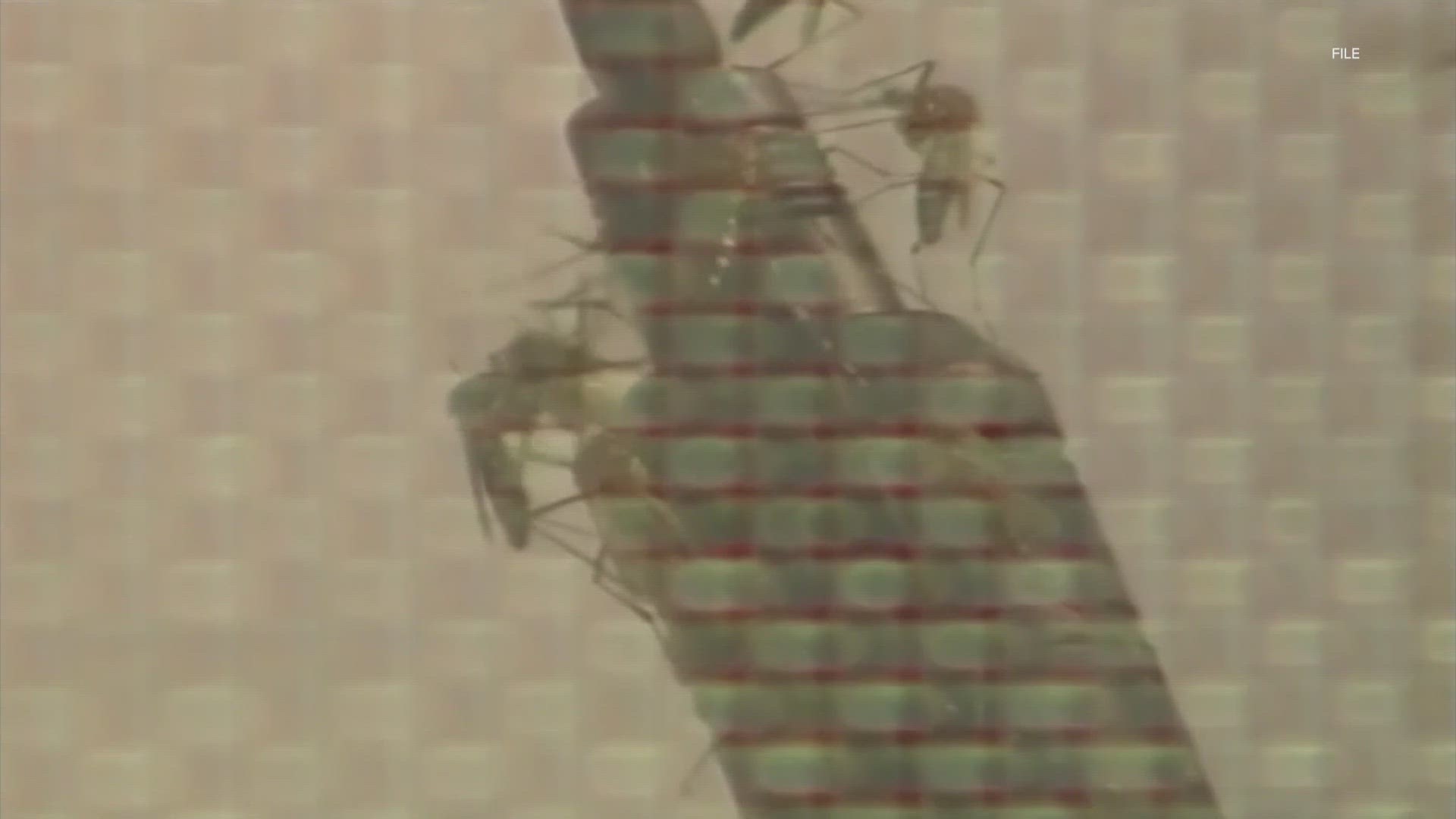FLORIDA, USA — Nearly everyone has been bitten by a mosquito before. According to the Centers for Disease Control and Prevention (CDC), 200 types of mosquitoes live in the United States, and about 12 types spread germs that can make people sick.
Recently on Twitter, some people have made claims that the government, along with Bill Gates, have released “genetically modified mosquitoes” and that they may be causing their mosquito bite bruises to be noticeably worse than previous years.
THE QUESTION
Do genetically modified mosquitoes exist?
THE SOURCES
- Florida Keys Mosquito Control District (FKMCD) - Oxitec Mosquito Project
- Dr. Nathan Rose, Head of Regulatory Affairs, Oxitec
- Dr. Floyd Shockley, Collections Manager, Department of Entomology at the Smithsonian National Museum of Natural History
- Centers for Disease Control and Prevention (CDC)
THE ANSWER
Yes, genetically modified mosquitoes do exist, but they're not harmful to humans. In fact, experts say they do not bite at all. Genetically modified mosquitoes were created to combat mosquitoes that spread disease.
WHAT WE FOUND
In 2021, Oxitec, a biotechnology company that develops genetically modified insects that safely and sustainably control pests that spread disease, damage crops and harm livestock across the globe, partnered with the Florida Keys Mosquito Control District (FKMCD) to evaluate the effectiveness of Oxitec mosquitoes to control the invasive, disease-spreading Aedes aegypti mosquito in the Florida Keys.
Aedes aegypti mosquitoes typically live in tropical and subtropical climates, according to the CDC. The agency says Aedes aegypti mosquitoes are more likely to spread Zika, dengue, chikungunya and other viruses than other types of mosquitoes because they live near and prefer to feed on people.
“One of the things that sort of works against the Aedes aegypti is that they are anthropophilic,” said Dr. Floyd Shockley, the collections manager in the Department of Entomology at the Smithsonian National Museum of Natural History. “Most of the mosquitoes that feed on humans tend to fly at night, but Aedes aegypti flies during the day. It's actually the mosquito that you usually run into when you're out hiking.”
Dr. Nathan Rose, the head of Regulatory Affairs at Oxitec, tells VERIFY the company produces genetically modified male mosquitoes to target the wild Aedes aegypti female mosquitoes because they are the main vector for viral diseases.
“It's important to note that there are probably around three and a half thousand different species of mosquitoes worldwide but only 30 or 40 of those actually transmit disease, and we're only targeting one of those species,” said Dr. Rose. “This mosquito should not be in North America or in South America — it comes from Central Africa. It made its way across the Atlantic a few hundred years ago. Within the U.S., this mosquito is found not just in Florida, but it's actually found throughout the southern U.S. You'll find it in Texas, you'll find it in the Gulf states, Louisiana, and so on, you'll also find it in California.”
Oxitec’s genetically modified mosquitoes have been released for over a decade in Brazil, the Cayman Islands, Panama and Malaysia, according to Rose. He says Oxitec was invited to do the project in the Florida Keys because the area has had a couple of outbreaks of Dengue fever in the last few years.
“In Brazil, we've probably released about a billion of these mosquitoes over the last 10 years, and they've been very effective in actually reducing the local mosquito population of this particular species,” said Rose. “The project in Florida is the first time that we're releasing these mosquitoes in the United States. It's a very small-scale project really just aimed at demonstrating that the mosquitoes work as effectively in the U.S. as we've already seen elsewhere.”
Rose says Oxitec’s genetically modified mosquitoes are male and they cannot bite people. He also explained how the company’s male mosquitoes combat the wild female Aedes aegypti mosquitoes from spreading disease to humans.
“It's a basic fact of mosquito biology that only females bite, males do not — and we're only releasing male mosquitoes. These are safe for humans and the environments in which they're being released,” said Rose.
“What the [genetically modified mosquitoes] do is they go and find the wild female mosquitoes, they mate with them and then they pass on two genes to their offspring. Those two genes, one of them is what we call a ‘self-limiting gene’ that causes all of the female offspring to die so that only the male offspring can survive,” Rose continued. “Then, the second gene in these mosquitoes is just a fluorescent gene. It helps us to identify our mosquitoes because our mosquitoes will then fluoresce. The wild ones are very different, so we can tell them apart under a microscope.”
Dr. Shockley tells VERIFY that Oxitec’s work will not affect other mosquito populations or other insects, but only the wild Aedes aegypti female mosquitoes that the company is targeting.
“Modification of insect populations has been around for a long, long time. It’s now being used more effectively with genetically modifying the genes,” said Shockley. “This won't affect other mosquitoes. This won't affect other insects. It will only affect the species targeted by the modification.”
According to its website, the Florida Keys Mosquito Control District (FKMCD) - Oxitec Mosquito Project has received approval from the U.S. Environmental Protection Agency (EPA), the CDC, and eight Florida agencies, including the Department of Health.
Rose says the project is fully funded by Oxitec, not the local, state, or federal government, or Bill Gates.
“The Bill and Melinda Gates Foundation does fund some of our other work on other mosquito species. They are funding us to work on two different species that transmit malaria, one in Africa, one in the Caribbean, but that has nothing to do with the work that's happening in Florida,” said Rose. “Mosquitoes are one of the biggest killers globally. If you have an effective way to control mosquitoes, you have an effective way to stop mosquito-borne diseases from being transmitted. That's very much what our focus is.”
More from VERIFY: No, hippos are not the deadliest animal in the world












